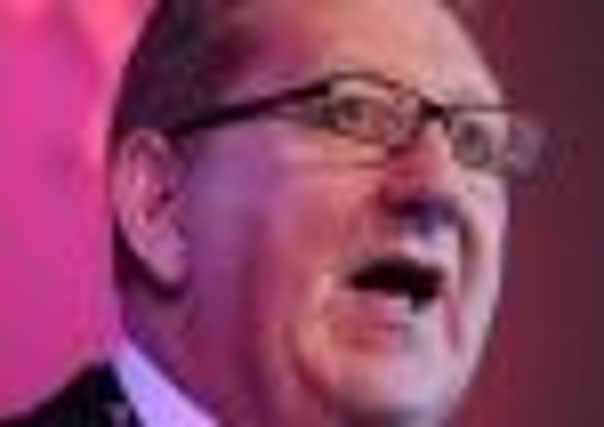Gregor Gall: Unite election a win-win for the left


The ballot closes today for the contest between two candidates for the leadership of the Unite union. With 1.4 million members, Unite is not only the biggest union in Britain but also the biggest affiliate to the Labour Party. Consequently, its general secretary is a powerful figure in the union movement and beyond.
By Monday, the result will be announced. The two candidates are the incumbent, Len McCluskey, and a grassroots challenger, Jerry Hicks. Whatever the outcome, the left will win because both McCluskey and Hicks are firmly on the left, albeit with Hicks being the more radical of the two. Even if Hicks loses, a good vote for him will embed the radical left further inside the union and solidify the foundations for McCluskey.
Advertisement
Hide AdAdvertisement
Hide AdOften dubbed “Red Len”, McCluskey is a 62-year-old former Liverpool docker who became a full-time local union officer in 1979 and then a national union officer in 1990. By the early 2000s, he had become a key player in the predecessor of Unite, the T&G, helping organise its broad Left grouping.
Hicks, some years McCluskey’s junior, is former union convener of Rolls-Royce in Bristol. He was sacked by the company in 2005 for his union activism. He stood in 2009 for the general secretaryship of Amicus – the other union that formed Unite with the T&G – and ran the incumbent fairly close. In 2010, he stood against McCluskey for the general secretaryship, winning just over half the number of votes McCluskey won.
The project that McCluskey is leading within Unite is to build a single union out of its two predecessors, which had quite different industrial and political traditions. The strategy being implemented by McCluskey is to a) emulate the T&G in its heyday of strong shopfloor organisation in the 1960s and 1970s; b) organise extra-workplace leverage over employers through corporate campaigns and targeting their supply chains; c) recruit community activists into membership and d) reclaim Labour politically from not only the Blairites but also the liberal left of Ed Miliband and Ed Balls.
Since his election, McCluskey has refused to repudiate any strikes by his members, set up a £25 million dispute fund to support them financially and encouraged members to fight back. Membership overall has begun to rise again and Unite is now at the forefront of the industrial class struggle. Under McCluskey, it has championed the cause of a general strike by all TUC-affiliated unions against the coalition government’s attacks on the welfare state and public expenditure.
However, McCluskey has been criticised by some for failing to turn words into deeds. And some others suggest that he can be inconsistent, flipping from being highly critical of Miliband to being a cheerleader for him and back again. The example of his extremely critical reaction to Miliband’s promotion of the idea of “responsible capitalism” in early 2012 can be contrasted to his glowing, positive endorsement of Miliband’s “one nation” ideology in late 2012.
In his own words, Hicks offers an alternative of “Len plus”. This means building on the existing achievements and objectives of his opponent through greater militancy and collective mobilisation. Hicks advocates that the anti-union laws should be defied, that Unite should only support Labour MPs who endorse Unite policies, and that all union full-time officers should be elected. He has promised to only take the average wage of Unite members if elected.
Hicks’s critics argue that because he is untried and untested in a senior union position, he lacks the authority and credibility to give effective leadership to such a large and diverse organisation as Unite. Others say he is just too left-wing and this will merely isolate Unite.
Whoever wins, Miliband and Cameron will face major challenges as a result. If McCluskey wins, it will embolden him to push on with his project, arguably speeding it up given that the clock will be ticking on his tenure. Equally well, his electorate will want to see clear results in double quick time as the prospect of a Labour government that does not reverse Coalition government cuts and privatisation will not be one they will easily stomach.
Advertisement
Hide AdAdvertisement
Hide AdThere will be battles over the manifesto on which Labour fights the 2015 general election, whoever wins the general secretaryship. Hicks does not believe in disaffiliating Unite from Labour but he does believe in pushing Labour to its limits.
For Cameron and the coalition government, they may savour the prospect of being able to slay a Hicks or McCluskey red dragon, and in the process, satisfy the readerships of the Sun, Mail and Telegraph newspapers.
Yet with continuing evidence that austerity is neither cutting government debt nor precipitating an economic recovery, either Hicks or McCluskey could become the tribune of the rising discontent of citizens. The unpopularity of the “bedroom tax” is beginning to crystallise this groundswell of disgruntlement. Unite has backed and organised protests against the “bedroom tax”. But if the winner of the Unite election rides this wave of dissatisfaction, it will pose big problems for Miliband. He has shown no willingness to lay out his alternatives to government policies, let alone radical or progressive ones.
Rather, he wants to bask in Cameron and Osborne’s unpopularity. Both Hicks and McCluskey are awkward enough to make the laying out of alternatives that put “clear red water” between Labour and the Tories and Liberals as the price of their support for Miliband.
• Gregor Gall is professor of industrial relations at the University of Bradford